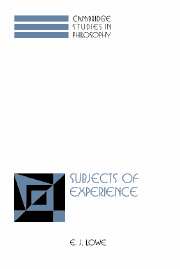3 - Mental causation
Published online by Cambridge University Press: 22 October 2009
Summary
It is widely supposed that dualist theories of the mind-body relation face an intractable difficulty concerning psychophysical causation – even if it is not always agreed what, precisely, the nature of the difficulty is. Perhaps two main, if vague, areas of concern can be identified, one more serious than the other. The first is that dualism, in allegedly representing the mind as utterly distinct from and unlike anything physical, has a problem in rendering intelligible any kind of causal nexus between the two domains. But the proper response to this, first given by Hume, is to deny that we should expect any causal nexus to be ‘intelligible’ in the sense in which dualism allegedly fails to represent psychophysical causation as being. One does not have to adopt a ‘Humean’ theory of causation – the ‘regularity’ or ‘constant conjunction’ theory – to avail oneself of this response (and, incidentally, it doesn't presently concern me whether Hume himself was a ‘Humean’ in this sense). All one has to draw from Hume is the idea that causal relations are not, in general, knowable a priori, like logicomathematical relations. Anyway, I have no intention of discussing further this (to my mind) spurious aspect of the supposed problem that psychophysical causation poses for the dualist. The more serious area of concern is created by the suspicion that dualist views of the mind-body relation – and certainly those that are interactionist – are somehow at odds with the findings of modern physical science: not only physiology and neurology, but also, more fundamentally, physics itself.
- Type
- Chapter
- Information
- Subjects of Experience , pp. 52 - 90Publisher: Cambridge University PressPrint publication year: 1996



